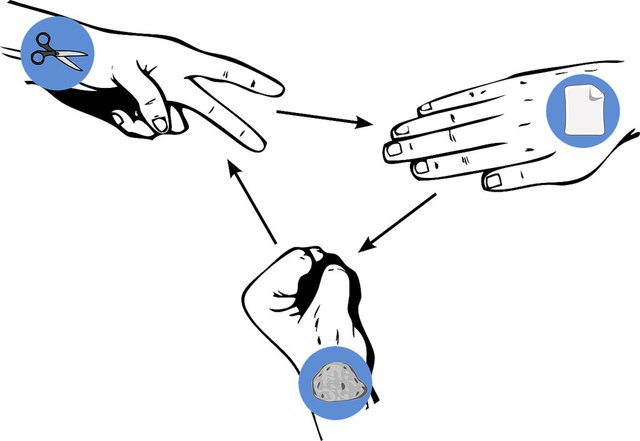How to Beat Rock Paper Scissors!

For most people, rock paper scissors (RPS) is a game of pure luck. A fair way to choose who pays for a round or gets to ride shotgun. But after reading this you should be able to tip the odds in your favour. There are even big RPS competitions with some lots of money on the line!
The Game
For those of you who don’t know the rules here is a quick overview. There are 2 players who will simultaneously throw one of 3 shapes with their hand (shown below). Rock beats scissors, scissors beats paper and paper beats rock. If both players throw the same, it is a draw. Simples.

If one person was to throw their hands completely randomly then the optimal strategy of the other person is to also play completely randomly. Fortunately for us HUMANS ARE TERRIBLE AT BEING RANDOM. For example many of you know that if you ask someone to pick a random number between 1 and 10, that 7 is picked roughly 25% of the time (depending on what study you look at). Or if I show you a group of large random numbers and show another person a group of small random numbers, when asked immediately after to pick any random number, you are more likely to pick a higher number than the person shown smaller numbers before.
The fact is we find it very hard to replicate randomness, and therefore there is a better strategy than random in RPG. Firstly let’s look at the stats.
The opening
In a report from the World RPS Society (yes that is real!) tournament players statistically throw the following proportions of hands:
Rock: 35.4%
Paper: 35%
Scissors: 29.6%
This may not be surprising if you think about historically how you have played the game. It may be that you start with a fist when you do the count down and people may be too lazy to change. Or some people believe that rock is seem a more the manly choice for some strange reason, and given that most people that play RPS are male, it leads to a higher proportion of rocks being thrown. Strangely it is also said that women tend to play scissors more often. Given that this is the case, we come to our first rule.
Rule 1:
Against a man play Paper first: you should only lose to a Scissors less than 30% of the time. Against a woman? Well no hard studies have been done on that yet so there’s another mystery about women for men ponder!
What studies have shown – the second throw
It is only after the first hand is thrown that the psychological battle really begins. There are a number of patterns that have been recognised that can help you win the long game. A study done by Zhijian Wang of Zhejiang University in China, showed that winners of the first round tend to stick to that shape whereas losers tend to switch. What was interesting was that they tend to switch around the persistent cycle of rock-paper-scissors. I.e. if they throw paper and lose to your scissors, your best guess is that they will chose scissors next as it is next in the sequence R-P-S.
Rule 2:
Depending on whether your opponent wins the first round adjust your strategy as follows: If just won, assume they will throw the same shape again and act accordingly. If they lost, assume they will switch to the next shape in the sequence rock-paper-scissors and act accordingly.
The real mind games begin!
The strategy above describes what to do against someone that hasn’t really ever thought deeply about the game and are going of their instincts. The rules won’t mean that you win every time, but they will certainly tip the odds in your favour over the long run. But what if you are playing against an opponent who also knows the strategy above?
Now it gets interesting! If you know that they know, then your optimal strategy becomes dependent not only on what strategy you think they know, but also whether you think they know that you know that they know!!!! And you can even go further up in levels until your head is spinning and you need to lie down.

In that situation, unless you can see into your opponent soul, you want to aim to revert to a strategy as close to random as possible. But humans are terrible at being random right? Then we need to find something in out surroundings that can seed randomness. Like a clock with a second hand hanging on the wall. Split the clock into 5 second chunks, cycling through R-P-S every 15 second quadrant, and depending where the second hand is when you start the count down, throw that shape irrespective of what you think your opponent might do. Then let your opponent hopefully defeat him/herself as they try to discover a pattern in your play!
Rule 3:
If you are playing a tough opponent, randomise your play.
Other strategies to mix up your play against weak opponents
- Say what you’re going throw and actually throw it! Most people will think you’re lying and you will win.
- Most people find it hard to throw the same shape 3 times, so if they have thrown scissors twice, expect them to change to rock on the next throw following the R-P-S cycle in rule 2.
Now you can enjoy all the free drinks and shotgun rides you are going to win from here on. And if you think you’ve got what it takes to play against the best, I’ll leave you with some inspiration and a link to the World RPS Society. Enjoy!
*Thank you to William Poundstone’s fantastic book “How to Predict the Unpredictable: The Art of Outsmarting Almost everyone” for introducing me to this topic. It is an extremely interesting read, covering a wide range of areas and I can highly recommend it if you have any interest in human psychology and behavioural economics.
I upvote U
Dear User known as @steemmcqueen
Steemit has a BOT problem! Your Vote Counts... Maybe
https://steemit.com/steemit/@weenis/bots-steemit-s-first-community-based-decision-on-bots-your-vote-counts-to-be-or-not-to-be-details-inside
I actually won a tournament in New York telling. Everyone I would throw paper every time and doing it. I won 4 or 5 rounds of a tourney this way